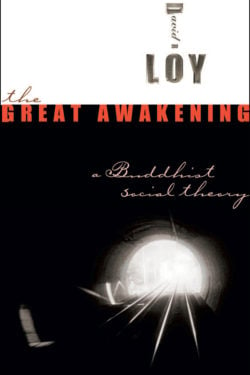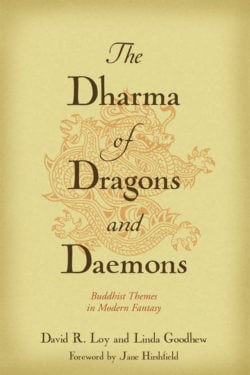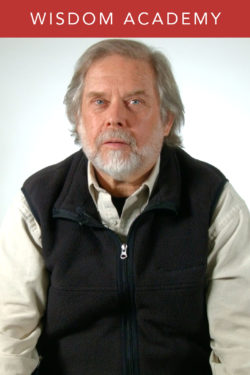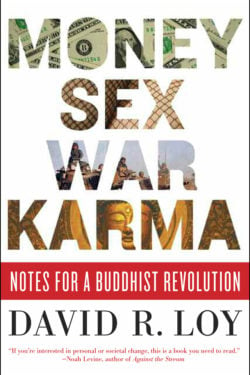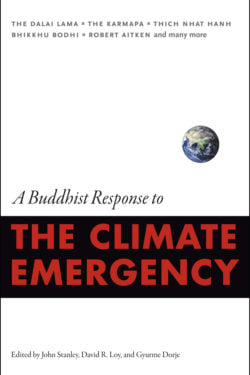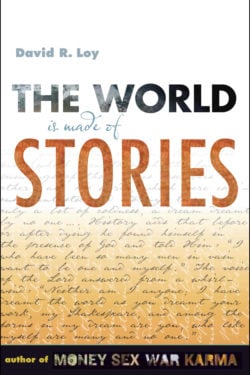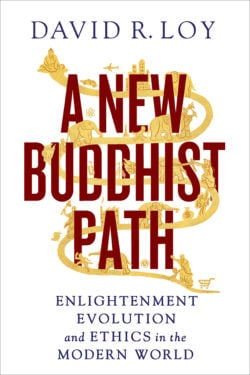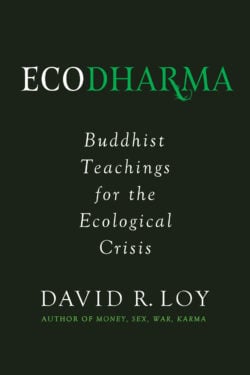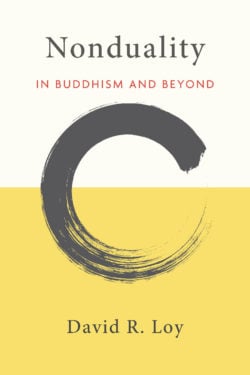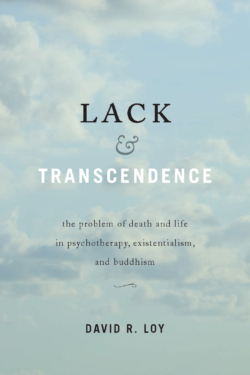David R. Loy
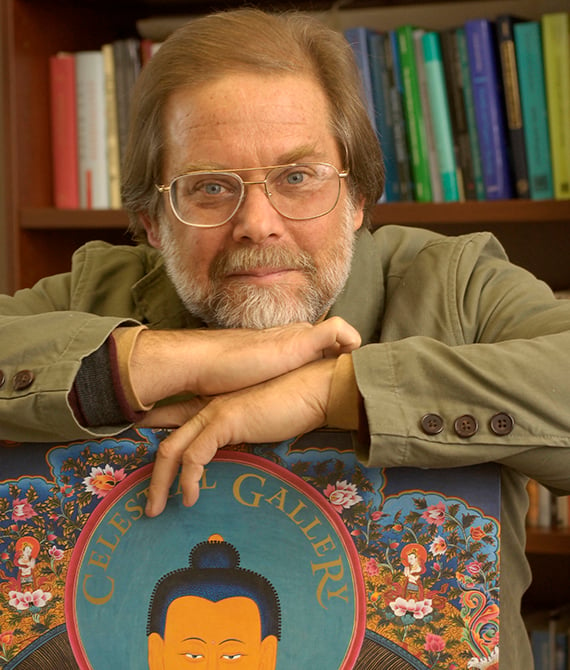
David R. Loy’s books include the acclaimed Money, Sex, War, Karma: Notes for a Buddhist Revolution; The Great Awakening: A Buddhist Social Theory; The World Is Made of Stories; A Buddhist Response to the Climate Emergency; and The Dharma of Dragons and Daemons, a finalist for the 2006 Mythopoeic Scholarship Award. He was the Besl Professor of Ethics/Religion and Society at Cincinnati’s Xavier University and is qualified as a teacher in the Sanbo Kyodan tradition of Japanese Buddhism.
Books, Courses & Podcasts
The Great Awakening
The most essential insight that Buddhism offers is that all our individual suffering arises from three and only three sources, known in Buddhism as the three poisons: greed, ill-will, and delusion. In The Great Awakening, scholar and Zen teacher David Loy examines how these three poisons, embodied in society’s institutions, lie at the root of all social maladies as well. The teachings of Buddhism present a way that the individual can counteract these to alleviate personal suffering, and in the The Great Awakening Loy boldly examines how these teachings can be applied to institutions and even whole cultures for the alleviation of suffering on a collective level.
This book will help both Buddhists and non-Buddhists to realize the social importance of Buddhist teachings, while providing a theoretical framework for socially engaged members of society to apply their spiritual principles to collective social issues. The Great Awakening shows how Buddhism can help our postmodern world develop liberative possibilities otherwise obscured by the anti-religious bias of so much contemporary social theory.
The Dharma of Dragons and Daemons
Many books are called groundbreaking, but this one is truly unique and sure to appeal to anyone with an interest in fantasy literature. It employs a Buddhist perspective to appreciate some of the major works of modern fantasy—and uses modern fantasy fiction to elucidate Buddhist teachings. In the tradition of David Loy’s cutting-edge presentation of a Buddhist social theory in The Great Awakening, this pioneering work of Buddhist literary analysis, renown scholar David Loy and Linda Goodhew offer ways of reading modern fantasy-genre fiction that illuminate both the stories themselves, and the universal qualities of Buddhist teachings. Authors examined include J.R.R. Tolkien, Philip Pullman (of The Amber Spyglass trilogy, from whose works the word “daemon” is borrowed in the title), Ursula K. LeGuin, and the anime movie Princess Mononoke.
The Dharma of Social and Ecological Engagement
In this course with renowned teacher David R. Loy, discover the path of socially and ecologically engaged dharma practice.
What would Buddhist social justice look like? What is the connection between personal and social transformation? Do the ancient teachings of Buddhism still ring true in a world that has changed drastically since the Buddha’s time—and does the wisdom of the Buddha have the power to transform our 21st-century society? Explore these important questions, and much more, in this exciting and timely course.
Money, Sex, War, Karma
- What’s Wrong with Sex?
- How to Drive Your Karma
- Consciousness Commodified
- The Karma of Food
- The Three Poisons, Institutionalized
- Why We Love War
These are just some of the chapters in this brilliant book from David R. Loy.
In little time, Loy has become one of the most powerful advocates of the Buddhist worldview, explaining like no one else its ability to transform the sociopolitical landscape of the modern world.
In this, his most accessible work to date, he offers sharp and even shockingly clear presentations of oft-misunderstood Buddhist staples-the working of karma, the nature of self, the causes of trouble on both the individual and societal levels-and the real reasons behind our collective sense of “never enough,” whether it’s time, money, sex, security… even war.
Loy’s “Buddhist Revolution” is nothing less than a radical change in the ways we can approach our lives, our planet, the collective delusions that pervade our language, culture, and even our spirituality.
A Buddhist Response to the Climate Emergency
Never before have so many teachers from all Buddhist traditions—Zen, Vajrayana, Theravada, Vipassana; from the West and the East—come together to offer a unified response to a matter of utmost urgency. This watershed volume is at the same time a clarion call to action and a bright beacon of hope.
With contributions from: His Holiness the Dalai Lama, the Seventeenth Karmapa, Sakya Trizin, Dudjom Rinpoche, Chatral Rinpoche, Ato Rinpoche, Dzongsar Khyentse Rinpoche, Thrangu Rinpoche, Dzigar Kongtrul Rinpoche, Chokyi Nyima Rinpoche, Ringu Tulku Rinpoche, Tsoknyi Rinpoche, Robert Aitken, Joanna Macy, Bhikkhu Bodhi, Joseph Goldstein, Taigen Dan Leighton, Susan Murphy, Matthieu Ricard, Hozan Alan Senauke, Lin Jensen, and Thich Nhat Hanh.
The World Is Made of Stories
Printed on demand. This book will be printed especially for you and will ship from a separate warehouse.
A Spirituality & Practice “Best Spiritual Books of 2010” winner.
In this dynamic and utterly novel presentation, David Loy explores the fascinating proposition that the stories we tell—about what is and is not possible, about ourselves, about right and wrong, life and death, about the world and everything in it—become the very building blocks of our experience and of reality itself. Loy uses an intriguing mixture of quotations from familiar and less-familiar sources and brief stand-alone micro-essays, engaging the reader in challenging and illuminating dialogue. As we come to see that the world is made—in a word—of stories, we come to a richer understanding of that most elusive of Buddhist ideas: shunyata, the “generative emptiness” that is the all-pervading quality inherent to all mental and physical forms in our ever-changing world. Reminiscent of Zen koans and works of sophisticated poetry, this book will reward both a casual read and deep reflection.
A New Buddhist Path
David R. Loy addresses head-on the most pressing issues of Buddhist philosophy in our time.
What is the meaning of enlightenment—is it an escape from the world, or is it a form of psychological healing?
How can one reconcile modern scientific theory with ancient religious teachings?
What is our role in the universe?
Loy shows us that neither Buddhism nor secular society by itself is sufficient to answer these questions. Instead, he investigates the unexpected intersections of the two. Through this exchange, he uncovers a new Buddhist way, one that is faithful to the important traditions of Buddhism but compatible with modernity. This way, we can see the world as it is truly is, realize our indivisibility from it, and learn that the world’s problems are our problems. This is a new path for a new world.
Ecodharma
This landmark work is simultaneously a manifesto, a blueprint, a call to action, and a deep comfort for troubling times. David R. Loy masterfully lays out the principles and perspectives of Ecodharma—the Buddhist response to our ecological predicament, a new term for a new development of the Buddhist tradition.
This book emphasizes the three aspects of Ecodharma:
- practicing in the natural world,
- exploring the ecological implications of Buddhist teachings,
- and embodying that understanding in the eco-activism that is needed today.
Offering a compelling framework and practical spiritual resources, Loy outlines the Ecosattva Path, a path of liberation and salvation for all beings and the world itself.
Prepare to be inspired, motivated, and encouraged.
Nonduality
The concept of nonduality lies at the very heart of Mahayana Buddhism. In the West, it’s usually associated with various kinds of absolute idealism in the West, or mystical traditions in the East—and as a result, many modern philosophers are poorly informed on the topic. Increasingly, however, nonduality is finding its way into Western philosophical debates. In this “scholarly but leisurely and very readable” (Spectrum Review) analysis of the philosophies of nondualism of (Hindu) Vedanta, Mahayana Buddhism, and Taoism, renowned thinker David R. Loy extracts what he calls “a core doctrine” of nonduality. Loy clarifies this easily misunderstood topic with thorough, subtle, and understandable analysis.
Lack and Transcendence
Whatever the differences in their methods and goals, psychotherapy, existentialism, and Buddhism are all concerned with the same fundamental issues of life and death—and death-in-life. In Lack and Transcendence (originally published by Humanities Press in 1996), David R. Loy brings all three traditions together, casting new light on each. Written in clear, jargon-free style that does not assume prior familiarity, this book will appeal to a wide variety of readers including psychotherapists and psychoanalysts, scholars of religion, Continental philosophers, and readers seeking clarity on the Great Matter itself. Loy draws from giants of psychotherapy, particularly Freud, Rollo May, Irvin Yalom, and Otto Rank; great existentialist thinkers, particularly Nietzsche, Kierkegaard, Heidegger, and Sartre; and the teachings Buddhism, particularly as interpreted by Nagarjuna, Huineng and Dogen. This is the definitive edition of Loy’s seminal classic.

